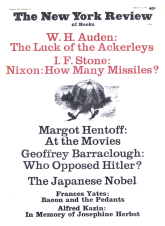In response to:
A Mao for All Seasons from the January 16, 1969 issue
To the Editors:
One would scarcely know from Martin Bernal’s review of Alberto Moravia’s book describing his visit to China that Moravia includes a witty, devastating and mocking analysis of what the “cultural revolution” has meant to Chinese art, literature, and culture; an essay which, by the way, was widely circulated in Italian and European publications last year. If Bernal is as “objective” and “accurate” in assessing the other books included in his round-robin review of China books in your January 16, 1969 issue, one really ought to see for himself!
For the cold realities of the “cultural revolution,” I refer readers to Neale Hunter’s piece (an Australian who taught in Shanghai during 1967 and 1968), entitled “Three Cadres from Shanghai,” published in the January-February issue of Dissent.
Stanley Plastrik
New York City
Martin Bernal replies:
The iconoclastic rampages of the Red Guards and the absurdities of the Mao cult have been widely reported in the West. In his description of them and their results, Alberto Moravia was going over ground that has been covered many times before. As he also had interesting and original things to say on other themes, I concentrated on these. I would never claim to be entirely “objective” and “accurate.” One of the points I tried to convey in the review was the belief that everyone—of course, including myself—is more or less the prisoner of his environment and limitations of knowledge. I hope that people do not accept a few hundred words in a review as a substitute for the book itself. I do not set out to write summaries, but I try to discuss aspects of books which I find stimulating or significant.
If Mr. Plastrik wants to boost his journal he is very welcome. Neale Hunter’s article, reprinted from that excellent magazine The Far Eastern Economic Review, is fascinating. Unlike Mr. Moravia, his personal observations provide us with new information on what it is like to be caught up in the Cultural Revolution.
This Issue
March 27, 1969



